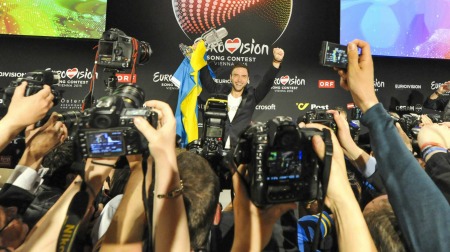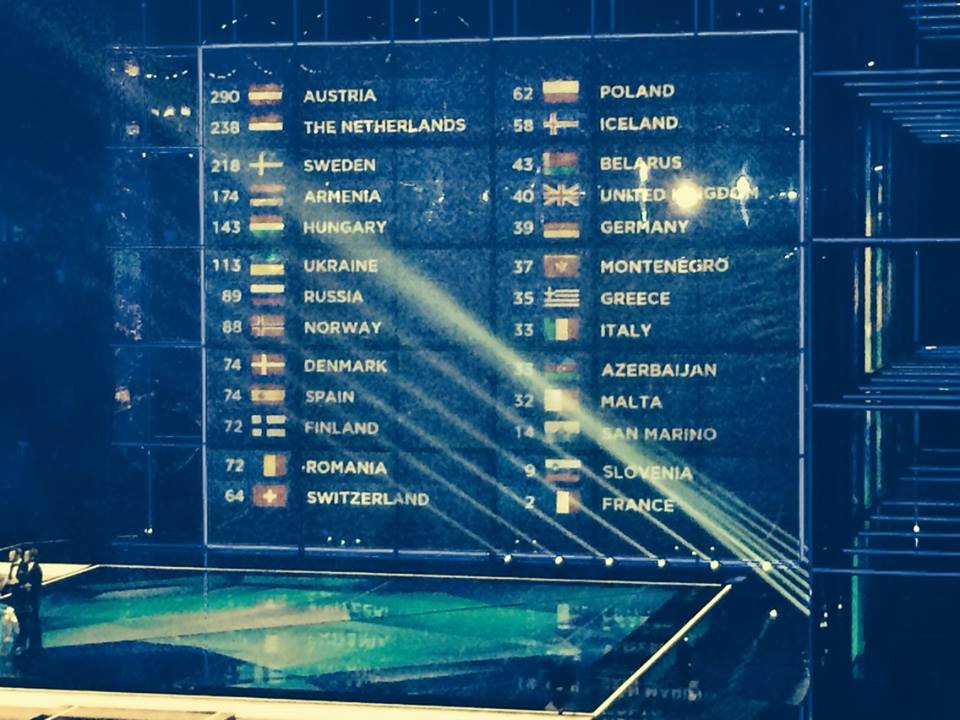Eurovision fans, I’m going to say something that might feel a little controversial and might not be something many of you agree with. I love the Eurovision Song Contests of the 2000s.
There, I said it and I’m proud of it. I know it doesn’t have the charm of some of the ‘90s contests nor the glamour of the 2010s but that’s precisely why they are special to me.
These ten Song Contests spanning Stockholm 2000 to Moscow 2009 were a transition period for the Contest unlike anything seen until that point or seen since in Eurovision history. They oversaw a period in which Eurovision invited more fans to attend, and expanded its participant numbers. They both increased and decreased the power of the viewers. They brought the Contest to several exciting, new corners of the continent and brought energy to the presentation of the final result. Whilst some or all of these Contests might not be to everybody’s personal taste, it is hard to disagree that these contests shaped the Eurovision Song Contest of today in many exciting and unique ways that this article will explore.
The Arena Show
When the Eurovision Song Contest kicked off the 2000s in the Globen in Stockholm, it was a statement of intent. Not only was it the biggest arena chosen to host Eurovision until then, but the show saw a record-breaking 13,000 audience members descend on southern Stockholm to be in the audience. These numbers were not only a then high watermark for fan engagement with the Song Contest but subjectively was also reflected in the atmosphere; which was less formal, more buoyant and more representative of the Eurovision audience we recognise today even in comparison to Jerusalem 1999; a show that took place only 350 days earlier.
Whether naturally or planned, Eurovision venues in the 2000s became bigger than before. In fact, since Jerusalem 1999, only two Eurovision venues have ever had a capacity of less than 10,000 people, Riga in 2003 and Tel Aviv in 2019. Even more intriguingly, Eurovision has since been hosted in venues of 20,000 people or more on seven occasions, Copenhagen in 2001, Belgrade in 2008, Moscow in 2009, Oslo in 2010, Dusseldorf in 2011, Baku in 2012 and Lisbon in 2018. On two of those occasions (Copenhagen and Dusseldorf), Eurovision was even hosted in a stadium, something that would have seemed unthinkable in the context of the previous decade of Eurovision venues.
Now bigger does not necessarily mean better, Ben Robertson of this parish has already written a fantastic piece that details the perils of venues that are too big to host contests. What is undoubtedly true is that if you have a bigger arena, you can fit in more audience members to generate a bigger atmosphere, you have more spaces to place cameras in order to create a more dynamic on-screen experience and you can construct a larger and more impressive stage on which to best present your show.
The transition of the show being hosted in theatres and convention centres to being hosted in arenas and stadia has raised the production, financial and artistic stakes of the Contest. This has perhaps meant a strain on broadcasters asked to host the contest (of which several had only recently begun participating) but ultimately, this has eventually been to the benefit of those countries who have been motivated towards either building from scratch or renovating existing arenas which have gone on to form valuable parts of their nation’s cultural landscape.
The Semi Final(s)
Today, the concept of relegation at the Eurovision Song Contest seems almost unthinkable but from 1994-2003, this was the best that the EBU could come up with as a means of keeping the main show at a manageable size.
When it arrived the one-shot Semi Final was by no means perfect and by the time there were four more participants in the Semi than the Final in 2007, it became slightly comic that the midweek show had more songs than Saturday night, but their value cannot be ignored in the context of the Song Contest today. If relegation had continued, we’d have a different roster of winners.
Who would not have won if relegation was still in place? Since 2004, the Eurovision-winning nation has placed in the bottom 5 of the previous year’s final on three occasions (Denmark in 2012, Israel in 2017 and the Netherlands in 2018). In the same timeframe, the Eurovision-winning nation has failed to qualify out of their Semi Final in the previous year on two occasions (Finland in 2005 and Austria in 2013). And finally, in the same timeframe, the Eurovision-winning nation did not even compete in the Contest of the previous year on three occasions (Serbia in 2006, Ukraine in 2015 and Portugal in 2016).
Whilst it’s tricky to predict how the EBU would have adapted its relegation rules to 43 countries being in the mix, there is a real possibility that half of the most recent Eurovision winners would have been ineligible to compete simply because of their nation’s performance 12 months earlier. This was an unjust rule that was rectified through the creation of the Semi Final.
Beyond simply acting as a fair means of whittling down the number of competing countries, the Semi Final (as a single show from 2004 and then as two shows from 2008) has become a welcome part of the Eurovision calendar, creating additional buzz and excitement in the build up towards the Saturday Grand Final and allowing us to see a side of the continent’s musical and performance taste that would otherwise remain hidden… step forward Slavko Kalezić, Ethno-Jazz Band Iriao and Conan Osíris among others.
The Televote
Generally speaking, some of the Eurovision Song Contest champions over the course of the 2000s weren’t exactly the most popular. Whatever you think of the outcome however, you have to respect the system under which those victories were recorded, ie the televote. From 2001, it was mandatory for televoting to be at least partly offered in all participating countries. This was a massive technological advancement given that televoting was only used at the Song Contest for the first time in 1997.
This single change completely transformed the way that people experience the contest. Eurovision was no longer about watching a show, it was about being a jury member in a continent-wide cultural celebration. The results were representative of the tastes of the very people that the show was supposed to entertain and this made a massive difference. People will argue about the jury-televote split for the rest of Eurovision history but what is certainly true is that the more audience members who are directly involved in the result, the more democratic the contest becomes and subsequently the more exciting a show for audiences around Europe.
There’s a reason that the climax of today’s Eurovision Song Contest is the announcement of the televote winner.
The Winners
Eurovision winners in this era were, and still are, rather divisive. What is also undeniable is that as a result of those winners, the Song Contest ventured to many exciting, new places, greatly expanding the reach and cultural impact of the contest.
During the 2000s, Eurovision was hosted for the first time in Estonia, Latvia, Turkey, Ukraine, Greece, Finland, Serbia and Russia and returned to Denmark for the first time since 1964. For these countries, hosting the Eurovision Song Contest represented a massive opportunity; hundreds of millions of audience members focused on their country, showcasing their identity through the hosts, postcards, interval acts and even the stage itself.
Additionally, their hosting the competition meant the chance to take full advantage of the shared knowledge of the EBU and its partners, improving both infrastructure and practice in a way that would benefit the host broadcaster for years to follow. Whilst the general format of the show remained largely the same year on year and the benefits of this opportunity were not exclusive to the winners from this decade, they were particularly welcomed by this group given that they had never had this special opportunity before.
It might be argued that the reason for this anomaly of so many nations winning the competition for the first time was as a direct result of the televote and neighbourly voting skewing the result. I don’t mind whatever the format was if these are the results that they produce, because it makes the show and the process of producing that show even more exciting for everybody within the Eurovision community.

Måns faces the awaiting journalists in the winner’s press conference.
Eurovision.tv
The Points Presentation
Arguably, nothing at Eurovision went through a more intense, public, fine-tuning process than the presentation of points at the contest. At the beginning of the decade, every point was still being announced from each participating country in English and French. By Moscow 2009, this had been abandoned in favour of only the 8, 10 & 12 points being announced (via a strange in-between compromise in 2004 and 2005).
This format suited Eurovision well until the voting revamp in 2016 that split the votes of the jury and the televote into two groups, rather than an aggregate score from each country. It created a voting presentation that gave an impression of each nation’s votes via the jury without taking too much time, it created an element of suspense that was engaging and energetic for the audience through the televote presentation, and it gave the commentators more options to tell the story of the voting during what could sometimes be a slow and laborious process (Eurovision Again reminded us of this all too well).
As much as many people are happy with the voting as it is today, I prefer the points being presented as 7-1 before the 8, 10, 12 crescendo because it gave a steady build towards a final result allowing runaway winners the time to bask in the glory and appreciate the size of their success (see the voting for Eurovision 2009) and highlighting close races in years when the result is well and truly very close (see the voting for Eurovision 2011).

A Closer Look At The Scoreboard
The 2000s Saw Vital Changes
It was Heraclitus who once said that “change is the only constant in life…” and so it is written that Eurovision is naturally structured to continue evolving both as a competition and as an entertainment programme.
Whilst Eurovision has been changing throughout its entire history, the changes made during the 2000s feel particularly special to me when I consider both the Contest as it is today and the Contest as it was when I first watched it in 2012. Furthermore, it is certain that the sheer number of changes made to the Contest in that ten-year period were remarkable and demonstrated a courage to experiment without the fear of making mistakes by the EBU and the various host broadcasters. Many of those changes were dictated by necessity but many could also have been resisted in favour of keeping the Eurovision Song Contest as the popular, traditional show it had been for over 40 years.

The thrill of victory for some mixed with the agony of defeat for others can turn the Eurovision Song Contest into an emotional rollercoaster for fans and artists.
As we look towards the first Eurovision Song Contest of the 2020s and towards Martin Österdahl’s first Song Contest as the Executive Supervisor of the EBU, I sincerely hope that he takes a page out of the book of Svante Stocksellius by ensuring that Eurovision continues to find the right balance of innovating its process whilst remaining true to the spirit of the Contest we know and love. I love the Eurovision of the 2000s because for me, the balance of both those elements was perfect.










excellent analysis. Thanks.
Is there a “been” missing in paragraph which begins “since the semi finals were introduced in 2004″…? Had to read several times before it made sense…
Thanks Mark, hopefully it’s a bit clearer now.
I love this! Are you doing an article for the other decades, too? Thank you!